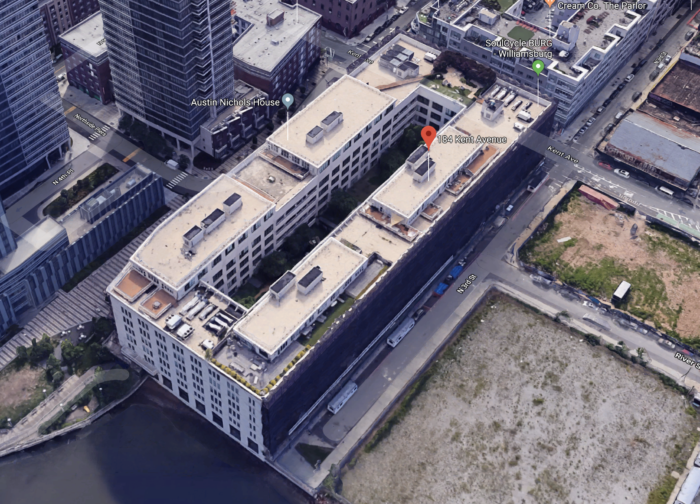Kushner Firm Harassed Tenants to Push Them Out, Says Lawsuit
Brooklyn borough president and watchdog group announce $10 million suit, charging "brazen disregard for human life"
Kushner and partners bought the waterfront rental building in 2015 for $275 million (Image by Google Maps)
“Tenants say it started early in the morning and went on until nightfall, so loud that it drowned out normal conversation, so violent it rattled pictures off the walls.” And then there was the dust, the rats, and construction workers barging into apartments unannounced.
So reads the Associated Press account of an alleged campaign of harassment by Jared Kushner’s family real-estate firm to push out tenants of a rent-stabilized building in Williamsburg to make way for condo buyers. An investigation by Housing Rights Initiative (HRI), a nonprofit watchdog group, came to a similar conclusion. “We’ve looked into hundreds of rent-stabilized buildings and this is one of the worst we’ve ever seen,” HRI founder Aaron Carr told the AP.
Carr and Brooklyn Borough President Eric Adams today announced a lawsuit on behalf of 19 plaintiffs, seeking $10 million in compensation from Kushner’s for tenants who allegedly suffered from harassment and unsafe living conditions. Dust samples taken from nine apartments in May by an environmental-consulting firm found dangerously high levels of lead and crystalline silica, which can lead to lung cancer and liver disease, the AP reported.
“Kushner Companies’ business model is steeped in illegality, depravity, and unending greed,” said Carr. “This is a company that has shown a brazen disregard for human life and an insatiable obsession with its bottom line.”

Borough President Eric Adams announcing the lawsuit today in front of the state courthouse in Downtown Brooklyn (Photo courtesy of the borough president’s office)
The building in question, at 184 Kent Ave., has a storied history. It was designed by architect Cass Gilbert, designer of the Woolworth Building, to serve as a warehouse for the Austin, Nichols and Co., a giant in the grocery business. The 1915 building was converted to rental apartments in 2010. Five years later, Kushner and partners bought the property for $275 million and set about renovating the building to convert it to condominiums with 250 different floor plans.
What stood in their way was that all but nine of the 338 apartments in the building were occupied by tenants with rent-stabilized leases. Yet Kushner and company were remarkably successful in getting the tenants out, emptying or selling more than 250 of the apartments in the last three years, the AP reported.
“To circumvent New York City’s housing laws,” Carr and Adams said in a statement, “it appears that Kushner Companies commenced a deliberate campaign to systematically harass its residents out of their apartments using illegal, dangerous, and destructive construction practices.”

An image from the Austin Nichols House’s promotional website
“It’s like having a root canal without the physical pain. … It was drilling from every direction,” former tenant Jane Coxwell, a chef who works nights and writes at home during the day, told the AP. She faced rats, flooding from a broken pipe, and a sudden visit from two workers with a passkey while she was at home in her underwear, she said.
Kushner Cos., which was led by Jared until he took on his role in the Trump Administration, acknowledged in a statement that it received some complaints about the construction, but said it responded to them and that “tremendous care was taken to prevent dust and inconvenience to tenants,” reported the AP. Additionally, the city’s Department of Buildings said it responded to dozens of complaints but found no rule violations.
Apartments in the building, which features high ceilings and East River views and typically rented for more than $3,000 for a one-bedroom unit, have sold for an average $1.2 million. Rechristened the Austin Nichols House, the building boasts amenities including a “jam room” for musicians.
Adams, describing tenant harassment as an epidemic in the borough, called for a better system for responding to complaints as soon as they’re registered. “We must do all that we can legislatively and through our courts to ensure our laws not only protect tenants, but aggressively prosecute violators so that justice is served accordingly,” he said.
Adams said the city needs to “deploy a CompStat-type mentality,” referring to the data-based crimefighting system used by the police department. “This mission is why I’ve funded and collaborated with non-profits like HRI who use data as a weapon in defense of tenants who are losing their homes in real time,” Adams said.













